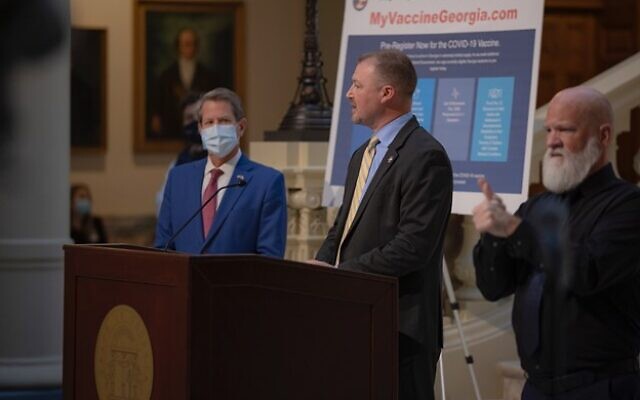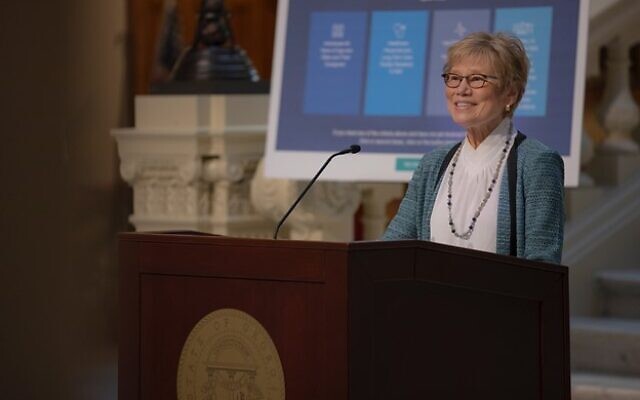School Teachers and Staff Get Vaccine Priority
Announcing expansion of the eligibility roll, Gov. Brian Kemp was clear about his desire to see children back in their classrooms.
Dave Schechter is a veteran journalist whose career includes writing and producing reports from Israel and elsewhere in the Middle East.

One week from today, another million or so Georgians will become eligible to receive a COVID-19 vaccine, even as demand for vaccinations continues to outstrip the supply of vaccine.
Gov. Brian Kemp announced last Thursday that — effective March 8 — the top priority group would expand to include teachers and staff in public and private K-12 schools as well as in pre-K programs and day care centers; adults with intellectual and developmental disabilities and their caregivers; and parents of children with complex medical conditions.
Kemp called this action “another step to protect the most vulnerable and get Georgia back to normal.” Tier 1a, which originally was comprised of frontline medical personnel and first responders, previously added Georgians age 65 and older.
The governor made clear his desire to see Georgia’s schoolchildren return to their classrooms. “Our children cannot afford to wait until the fall. The costs are simply too high,” he said. “Georgians deserve to return to normal as soon as possible, and that will not happen without schoolhouse doors open for face-to-face instruction each and every day.”

The governor said that “Virtual schooling is leaving too many children behind and parents at their wits’ end. We must have students back in the classroom, five days a week.” To achieve this goal, the state will rely on local school districts to determine the most efficient way to vaccinate their teachers and staffs.
Kemp said that the state had administered 81 percent of the Pfizer/BioNTech and Moderna vaccine doses it had received from the federal government. As of Feb. 25, the state had administered 1.9 million doses of vaccine to 1.2 million Georgians. The top priority tier currently includes an estimated 2 million people. Kemp said that Georgia’s allocation has increased 70 percent since January; the state now receiving about 200,000 first doses per week.
Anticipating the emergency use order that the federal Food and Drug Administration issued Saturday for the single-shot Johnson & Johnson vaccine, Kemp cautioned, “There will be more demand for the vaccine than the state has supply. I continue to ask Georgians for their patience.”
Kemp also said that about 800,000 Georgians age 65 or older, about 57 percent of that age group statewide, had received at least one vaccination. That population also accounts for three-quarters of the deaths linked to COVID-19.
Data from the White House report on the COVID-19 situation in Georgia showed the state trailing the national average in the percentage of its adult population that had received its first vaccine dose, but matching the national average for the percentage that had completed the two-dose regimen. According to the Centers for Disease Control and Prevention, Georgia ranks fifth-lowest among the states in its vaccination rate per 100,000 population.
James C. Stallings, director of the Georgia Emergency Management Agency, said that the four, recently-opened mass vaccination sites — in Albany, Clarkesville, Macon and metro Atlanta — had vaccinated more than 11,000 people in their first three days of operation.
Dr. Kathleen Toomey, Commissioner of the Georgia Department of Public Health, said that a committee would be formed in consultation with children’s hospitals to determine which “complex medical conditions” would first be included in the vaccine eligibility.

Kemp held out the prospect that by late March, provided that the state continues to receive an increased allotment of vaccines, Georgians below the age of 65 with several underlying health conditions, would be added to the eligibility rolls.
The governor said that the expanded criteria do not currently include employees of the state’s universities and colleges because those institutions have other means of preventing spread of the virus, such as social distancing, and are dealing with an older population than the K-12 schools.
As of Feb. 25, the Georgia Department of Public Health reported 14,989 confirmed COVID-19 deaths. Kemp said that Georgia’s rates of new COVID-19 cases and the rate of positive tests were at their lowest level in months. CDC data from Feb. 13-19 found Georgia ranking sixth among the states in its rate of new cases, declining slower than the nation as a whole, and third in the rate of deaths, higher than the nation as a whole.



comments